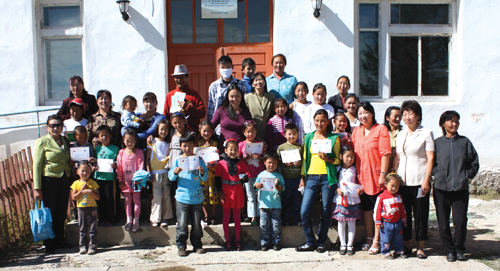By Jeffrey Osborn
Northwest Asian Weekly

Students from Ikh Tamir Elementary School in Mongolia, who were Blue Sky scholarship recipients (Photo from Bellingham Sister Cities Association)
Mongolia is often referred to as the land of eternal blue sky.
To understand this nickname, one must look back to times long ago, when a religion known as Tengriism was powerful in Central Asia. Though no longer a major religion, there are some who still practice Tengriism.
Those who practice the religion often pray to Tengri Munkh Khukh Tengri, which means Eternal Blue Sky.
Blue Sky Education Project
It should come as no surprise that Bolor Smith, a native Mongolian now living in Bellingham, chose to name a nonprofit organization that focuses on sending kids in Mongolia to the school “The Blue Sky Education Project.”
“As a child growing up in the countryside, I knew, you know, people need food and people need clothes. Those things are needed, but something that can change their lives forever is education. So I can’t imagine my life without getting an education. I can’t imagine how my life would be without that.”
The Blue Sky Education Project started with a conversation between friends and colleagues. “My friend Andrea Gabriel, who is co-founder of the Blue Sky Education Project, went to Mongolia in [the summer of] 2008. So she came back, and we had just talked about things, and we had this idea: “Why can’t we have a nonprofit that helps these kids go to school?”

An overview of Tsetserleg, Mongolia — Bellingham's new sister city (Photo from Bellingham Sister Cities Association)
To start, Smith and Gabriel began discussing difficulties with Mongolians attending schools. They came to the conclusion that much of Mongolia is rural and that these rural families often couldn’t afford to buy proper school uniforms. It was also concluded that many rural, nomadic tribes had to send their children to boarding schools for as many as nine months out of the year so they could attend a public school. This created great heartache for the parents and children alike. Even when children were able to attend school under these circumstances, the distance was often too great to travel.
“[Andrea and I] had this idea, ‘Why can’t we, instead of kids coming to the boarding school, why can’t we have the teachers out there […] so they don’t have to travel and they don’t have to lose that nomadic tradition they have?’ ”
This led to a natural evolution of thoughts on how to accomplish these goals. The idea that reverberated best with both Smith and Gabriel was the idea of a sponsorship program, having people in America donate enough to sponsor a student for one year.
“Fifty dollars can provide enough funds to buy textbooks, uniforms, school supplies, and encourage a direct connection between the sponsors and the students,” said Smith.
This concept has seen a gradual buildup of support over the years since the Blue Sky Education Project began accepting donations in 2008.
“In 2009, we had 10 kids, 10 sponsors,” said Smith. “In 2010, we made it to 76 kids. This year, we actually had 100 kids get sponsorship through our program.”
An affirmation of this success can be found on the Blue Sky Education Project’s blog, where a young girl and beneficiary of the project writes, “Hello, my beloved brothers and sisters. My name is Munguntamir. Wishing you good health, peace, and all the best of this world. Happy New Year and Happy Rabbit Year (Mongolian New Year). I am thankful for your help. I am getting straight ‘A’s. I became the dance champion this year. I will return your kindness and help. I am going to be a doctor when I grow up and will help all those who are suffering and ill. I live with my mom, dad, brother, and sister.”
Bellingham and the Mongolia Connection
The drive to help others learn and succeed in life is part of what inspired Smith to start the Blue Sky Education Project in the city of Bellingham.
“The connection between Bellingham and Mongolia started a long time ago.” Smith explains, “Not many people know that the library at Western Washington University has one of the biggest Mongolian collections of books […], so one of the biggest Mongolian libraries in the world outside of Mongolia actually is in Bellingham.”
This is due in no small part to a man named Henry Schwarz, a retired professor at Western Washington University, who continues to work with the university on a number of projects, including the Mongolian literature collection.
In an article written for Western Today, a publication of Western Washington University, Schwarz is quoted as saying, “We are the main source in North America for books on Mongolia and the surrounding areas.”
Bragging rights apply when you can say, “Western’s collection is bigger even than the one at the Library of Congress.”
According to the article in Western Today, Schwarz alone had donated 16,601 volumes to the Mongolia collection as of 2009 and continues to donate to this day.
The connection between Mongolia and Bellingham deepened recently. On Aug. 21, 2011, Bellingham signed an official sister city agreement with the city of Tsetserleg, Mongolia. During the celebrations, Smith was able to hand scholarships from the Blue Sky Education Project to the beneficiaries directly. (end)
Jeffrey Osborn can be reached at info@nwasianweekly.com.



